Alexandra Boulat
-
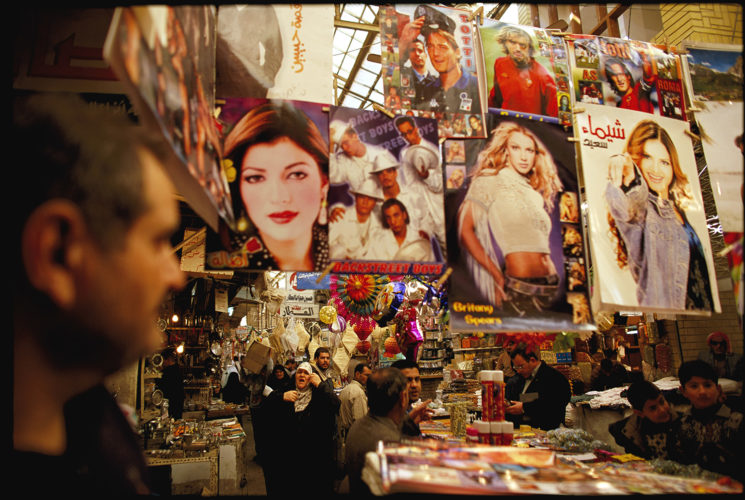
Baghdad before the bombs
-
January 28, 2003 - It's become a cliché to show cloaked Muslim women in contrast to images of Western culture. Still, I never cease to be surprised by how modern Baghdad is, how it stepped in recent trends in music, movies, fashion and sports, considering it's been under embargo for 12 years. Shopkeepers here seem educated about the West-but also keenly aware of their city's ancient heritage. -
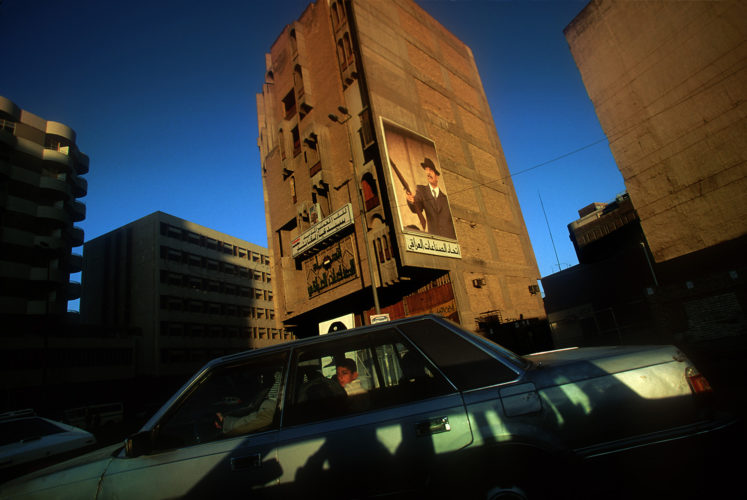
Baghdad before the bombs
-
February 2003 - Baghdad Streets during Saddam Hussein 's regime, few days before the Allies invasion of Iraq. -
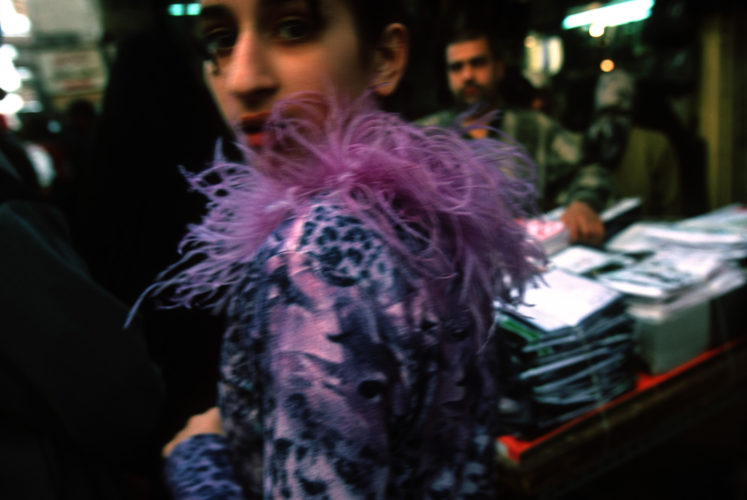
Baghdad before the bombs
-
February 2003 - A young girl in Baghdad street, during Saddam Hussein's regime, few days before the Allies invasion of Iraq. -
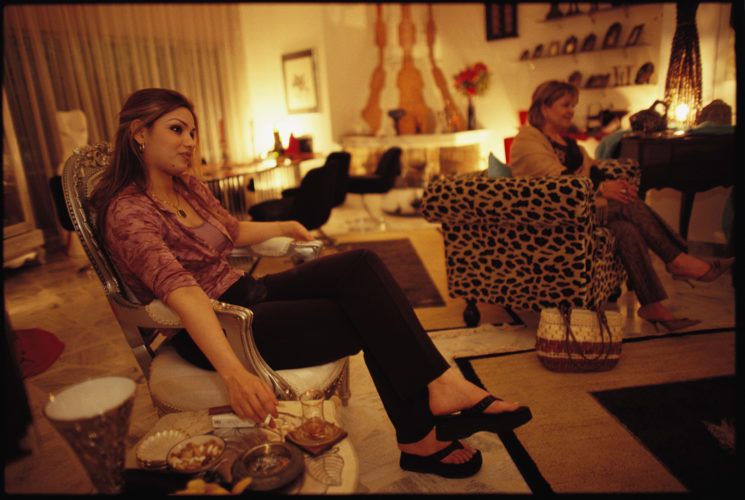
Baghdad before the bombs
-
February 2003 - I had dinner with art gallery owner Samira Abdulwahab, and her daughter-in-law, left, at their home in a wealthy Baghdad suburb. Charming and open-minded, Samira is one of the elite Iraqis who've done well under the current regime. But despite the warm lighting and cozy sofas, the mood was tense. Samira found it hard to make small talk and was consumed with worry. She feared her world was about to end. -
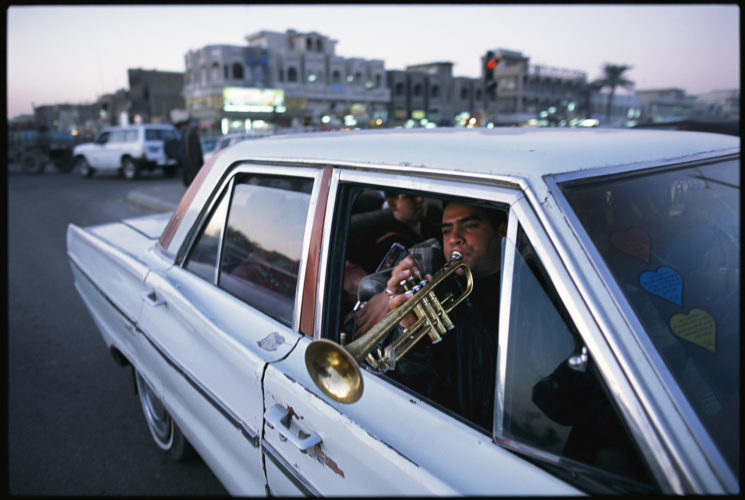
Baghdad before the bombs
-
February 10, 2003 - Stuck in traffic this afternoon, I came across a wedding procession on it's way from the bride's home to a fancy downtown hotel, serenaded by the musicians hired to accompany them. Soon the marriage season that precedes Muharram will end, but now people are busy getting married. Wedding cars wind through Baghdad, blasting happy music into streets that may soon turn dangerous and sad, as the war threats are getting closer. -
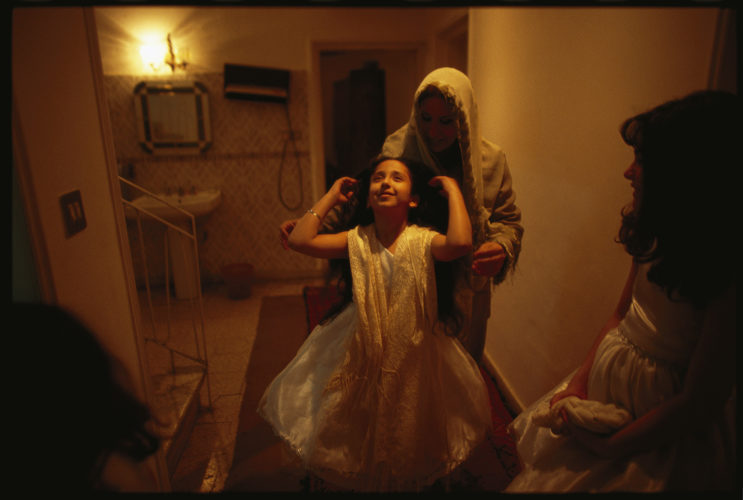
Baghdad before the bombs
-
February 2003 - Shaima's wedding is today, and her father's house is in an uproar. The men have left, and I've stayed behind with the women to get ready. Spending so much money on a wedding right before a war seems absurd, but Shaima's family, like many, clings to a normal life. As one Iraqi told me, "Live today as if tomorrow doesn't exist". -
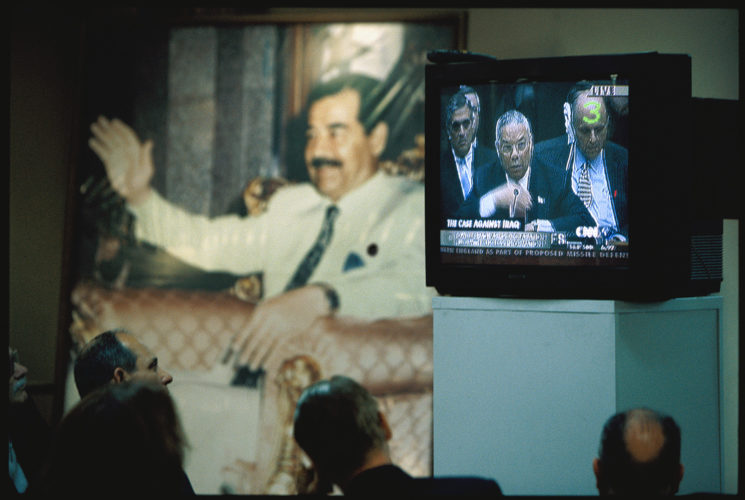
Baghdad before the bombs
-
February 5, 2003 - Minister of Information conference room in Baghdad. Foreign press, foreign delegates and ministry staff watch Colin Powell's speech on TV, about Iraq's weapons of mass destruction. -
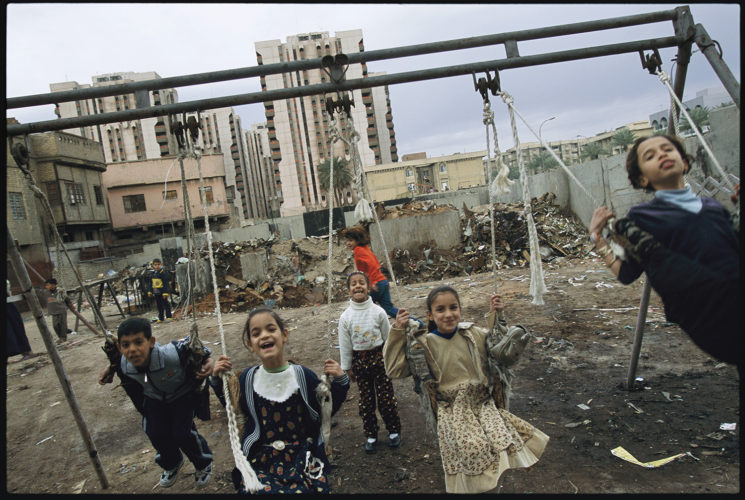
Baghdad before the bombs
-
February 11, 2003 - Today the Iraqis forgot about their problems. It was Aïd al-Adha, the Muslim holiday marking the end of the haji season, and everyone was out celebrating. In a poor part of the town I found a group of kids having fun in what passes for a playground, getting their fancy clothes all dirty. It's tragic to think that, war or no war, one upon eight children in Iraq do not see their fifth birthday. -
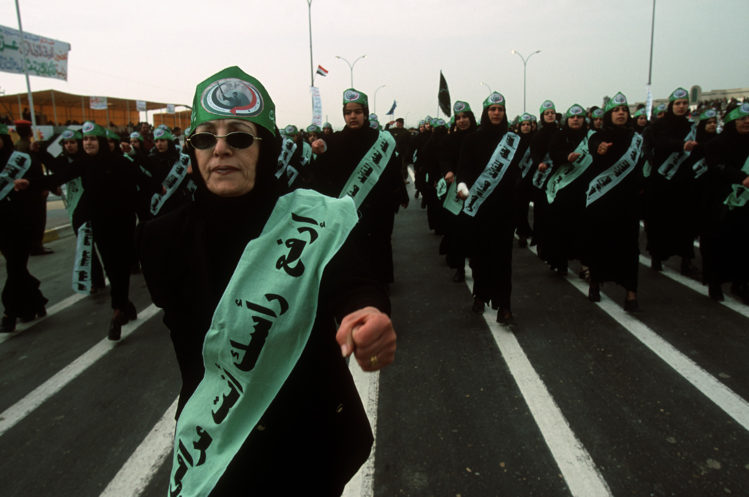
Baghdad before the bombs
-
February 2003 - Military parade in Mossul, few weeks before the Allies invasion of Iraq. -
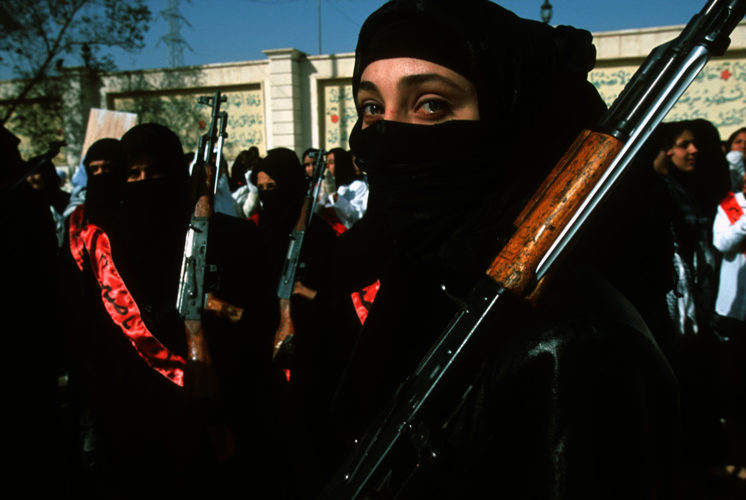
Baghdad before the bombs
-
February 2003 - Military parade in Tikrit, few weeks before the Allies invasion of Iraq. -
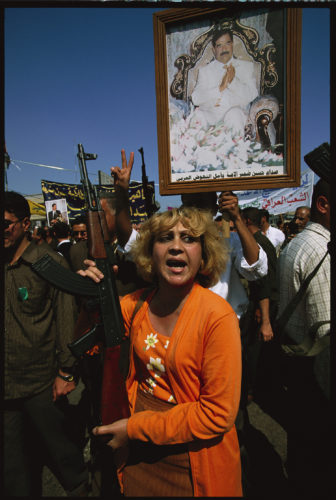
Baghdad before the bombs
-
February 23 - This morning I witness a pro-Saddam demonstration in the district of al Mansur, which was flooded with middle-class protesters chanting "Down, down Bush!" and "Victory Saddam!". Thousands of people attended the five-hour rally, including gun-toting secretaries and students bused in by government officials. My guide's 15-year-old daughter saw the rally as an adventure, although her interest seemed more social than political. -
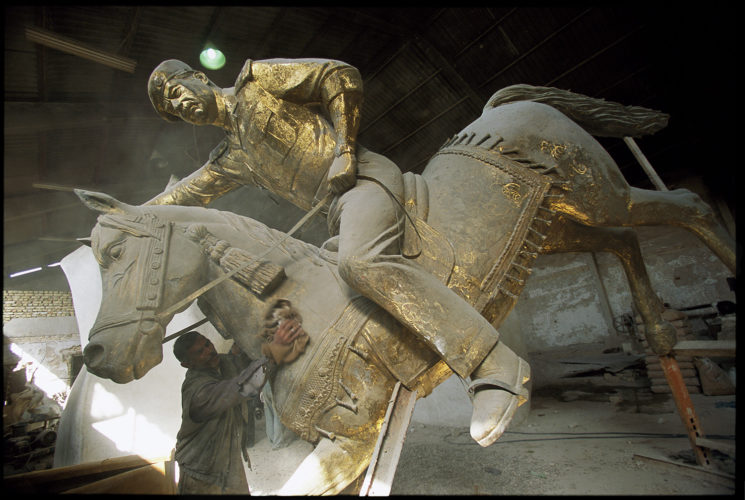
Baghdad before the bombs
-
March 2003 - Today I visited an official sculpture studio, where I found Saddam Hussein riding a horse straight out of the Arabian Nights. In a city where no one feel free to criticize the government, the workers were worried about letting me photograph this statue, covered with dust and in need to be repaired. -
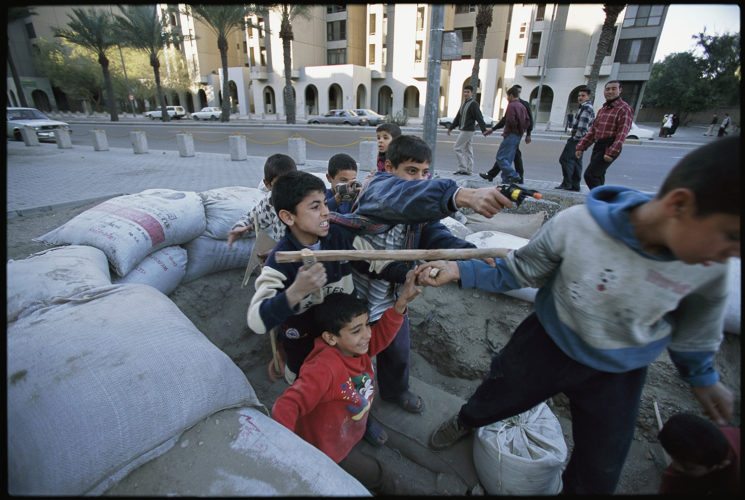
Baghdad before the bombs
-
March 5, 2003 - I've been surprised by the lack of military preparation in the city. But today I noticed a few sandbags piled on the streets, miniature fortresses built by the army in strategic locations like traffic circles. Kids couldn't resist playing in them and pretending to fight the Americans. While they were blasting away, I made mental notes of those intersections-good places to avoid them once the real war begins. -
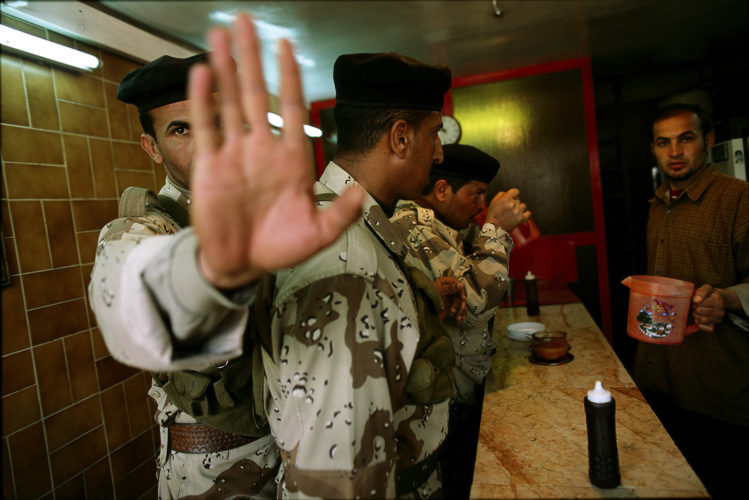
Baghdad before the bombs
-
March 5, 2003 - "Enough pictures!" said this soldier, stopping for tea at one of the city's many falafel stands. Iraqis love to be photographed, but I'd already taken a whole roll of this guys at the military parade. They seemed edgy as US forces gathered on the Iraqi border. -
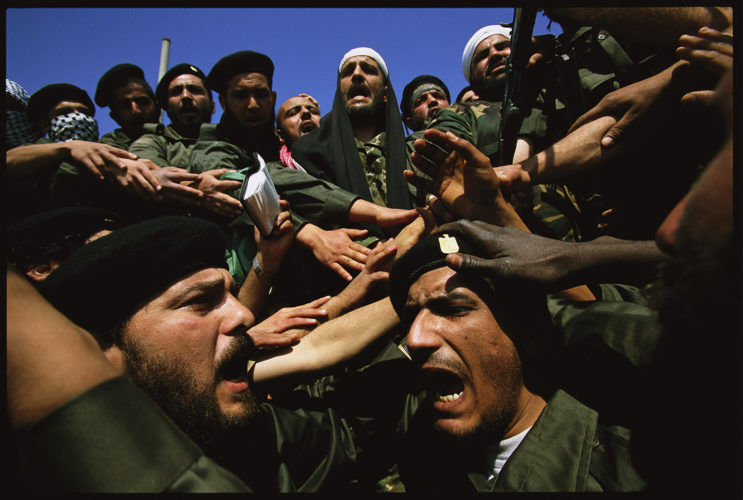
Baghdad before the bombs
-
March 12, 2003 - I was taken to photograph a hundred or so foreign Arab fighters at a military training camp south of Baghdad. These guys were training as mujahidin to fight alongside Iraqi soldiers. Saddam is a secular leader and a less than devout Muslim, but that hasn't stopped him for trying to mobilize the Muslim world for a jihad, or holy war, and a rerun of the Afghan conflict with the Soviet Union. -
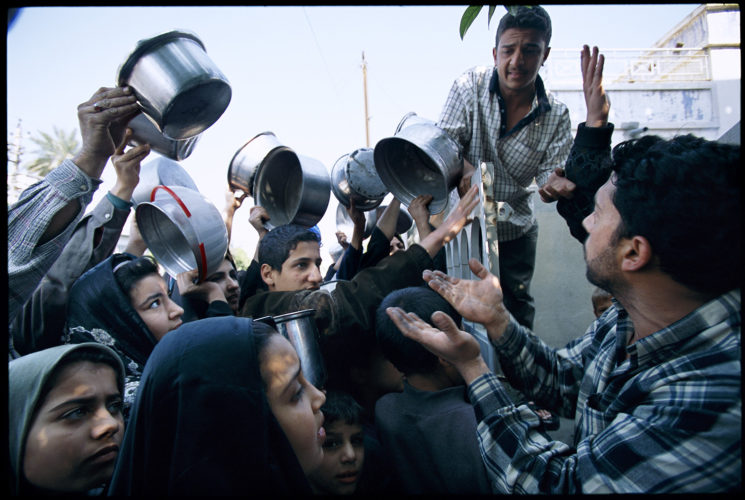
Baghdad before the bombs
-
March 13, 2003 - Early morning I followed a crowd of Shiites distributing food to the poor in observance of a special day in Muharram, the first month of the Muslim year. My guide asked why I was in such a hurry to get these shots, noting that this food distribution would continue throughout the month. I felt bad telling her what was painfully obvious to me: With war only days away, even the rich may soon get hungry. -
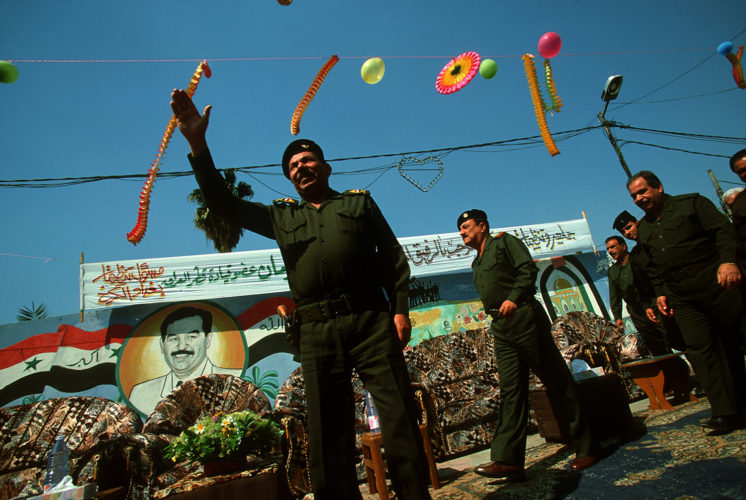
Baghdad before the bombs
-
March 15, 2003 - On the eve of the war, Saddam Hussein's regime dignitaries, and Ba'ath party members attend a demonstration against the war in the Al Mansour district of Baghdad. -
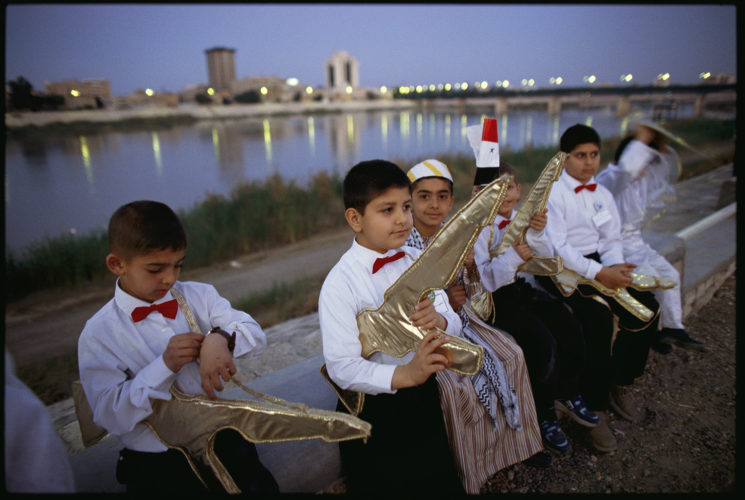
Baghdad before the bombs
-
March 16, 2003 - Armed with make-believe Kalashnikovs, a group of Baghdad schoolboys waited beside the Tigris River to greet a bus load with foreign peace activists who'd volunteered to come to Baghdad as human shields. Like actors in a play, the boys sang pro-Saddam songs in a little parade. The whole scene seemed pathetic-and futile given the breakdown of diplomacy. On March 17th. President Bush announced that Saddam had 48 hours to leave Iraq. -
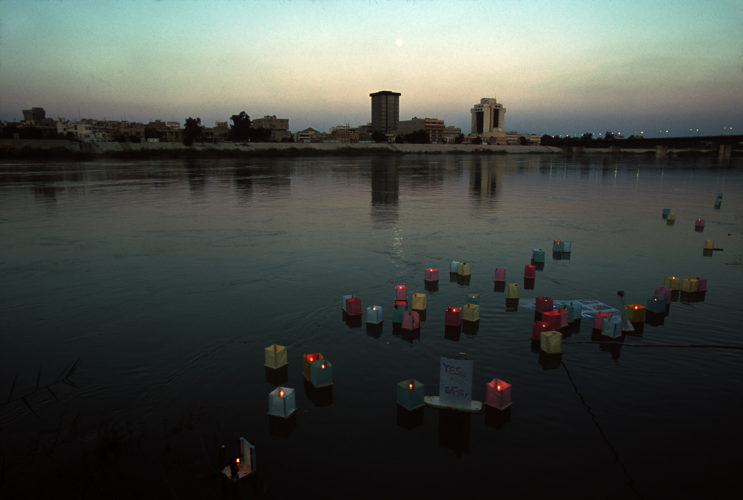
Baghdad before the bombs
-
March 16, 2003 - Foreign peace activists who came to Baghdad as human shields set candles on the Tigris river, a symbolic effort to stop the soon to come coalition attacks against Iraq. -
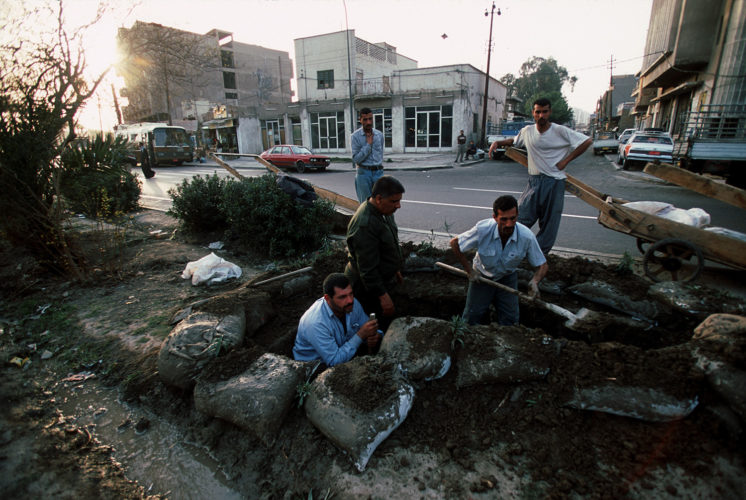
Baghdad before the bombs
-
March 2003 - People digging sand bag defense position in Baghdad, few weeks before the Allies invasion of Iraq. -
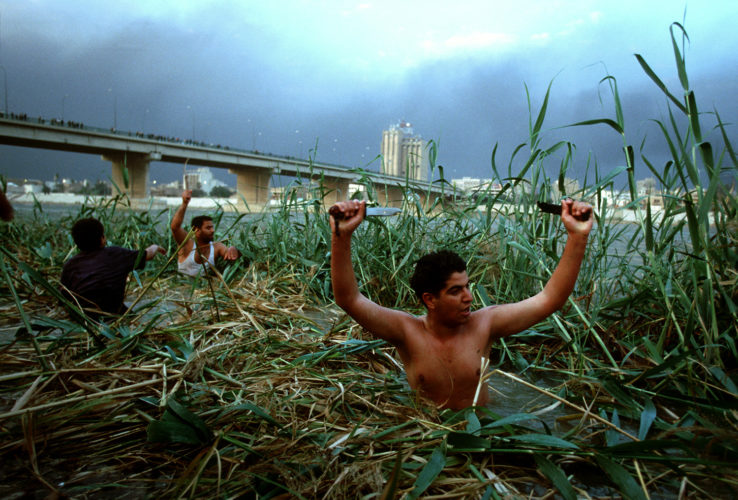
Baghdad before the bombs
-
March 2003 - Young Iraqis are looking for a US military pilote on the bank of the Tigris river down town Baghdad, as the coalition forces have started the invasion of Iraq. -
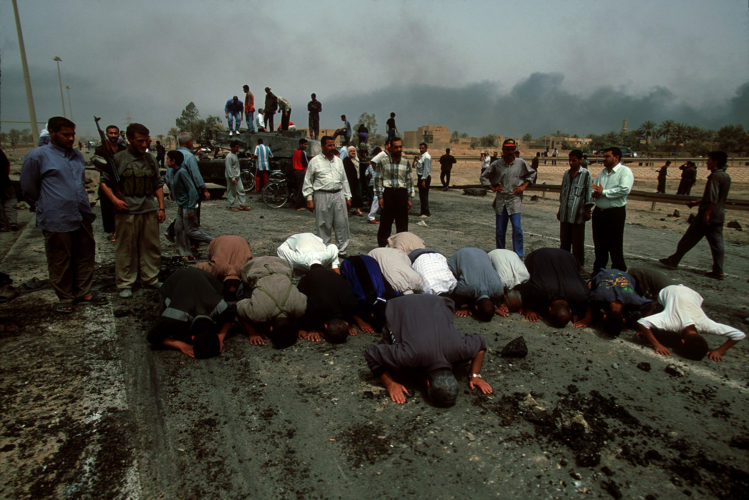
Baghdad before the bombs
-
April 2003 - Iraqis praying near a US Abraham tank abandoned by the American troops during their advance towards Baghdad airport, as the coalition forces are invading Iraq. -
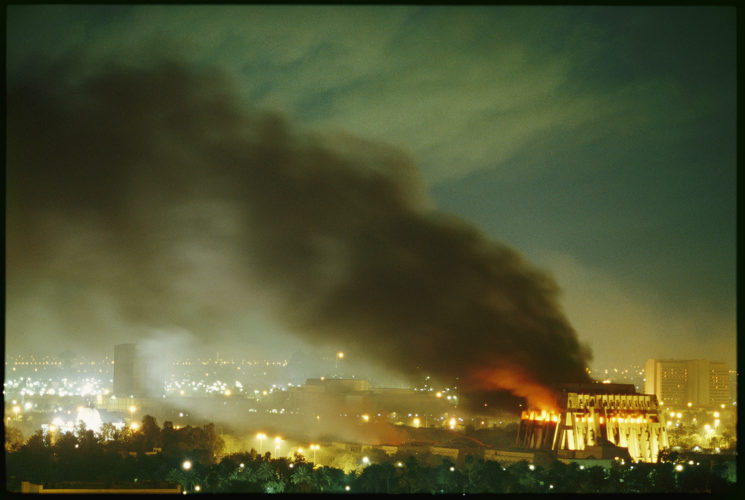
Baghdad under the bombs
-
March 21, 2003 - American bombing on the Presidential Palace in Baghdad. -
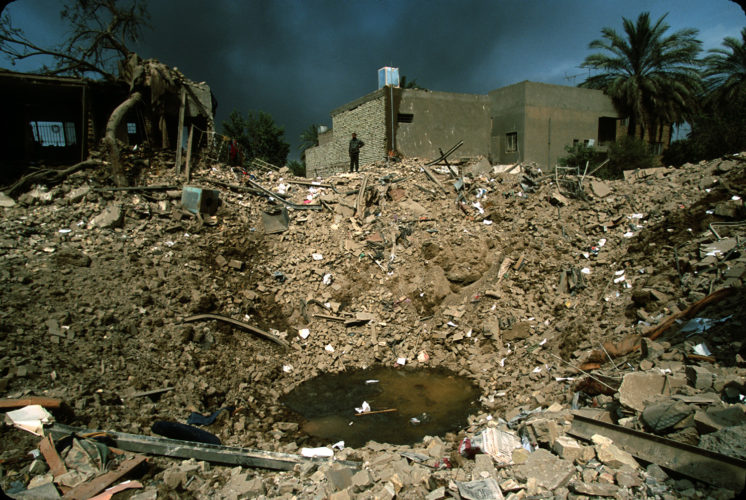
Baghdad under the bombs
-
March 2003 - Damages after the bombing of a civilian area down town Baghdad during coalition air raids to invade Iraq. -
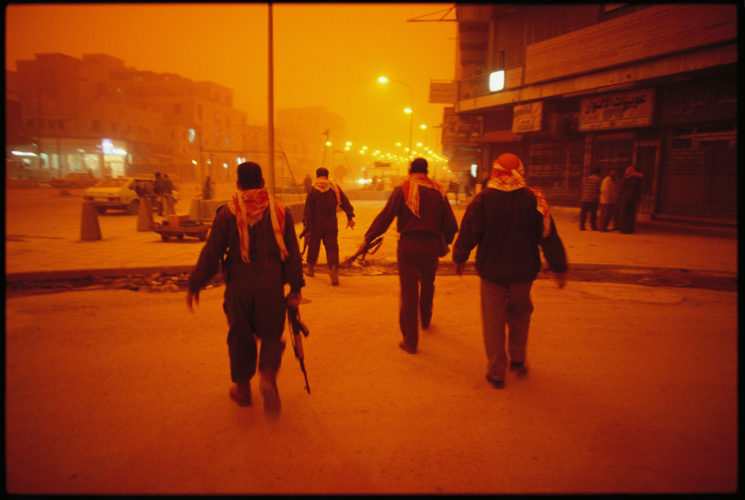
Baghdad under the bombs
-
March 25, 2003 - The Storm Behind the Calm The bombing has slowed a bit, probably because of the sandstorm that stifled Baghdad for the past two days, blanketing the city in an ominous red glow and lulling its residents into a strange lethargy. People can't remember anything like it in their lifetimes. Men with guns wander around in the haze, saying the storm is a gift from God because it is thwarting the U.S. troops' advance on the city. It's bizarre because this dusty, oppressive weather is exactly the kind people usually hate, yet now everyone embraces it. They keep hoping the storm will never end. -
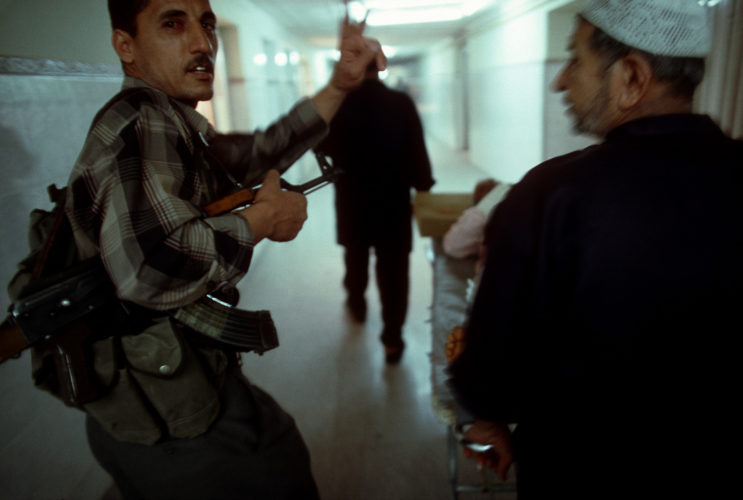
Baghdad under the bombs
-
March 2033 - An Iraqi defender at Al Yarnouk Hospital in Baghdad during the air raid of the coalition forces that sent hundreds to the emergency room. -
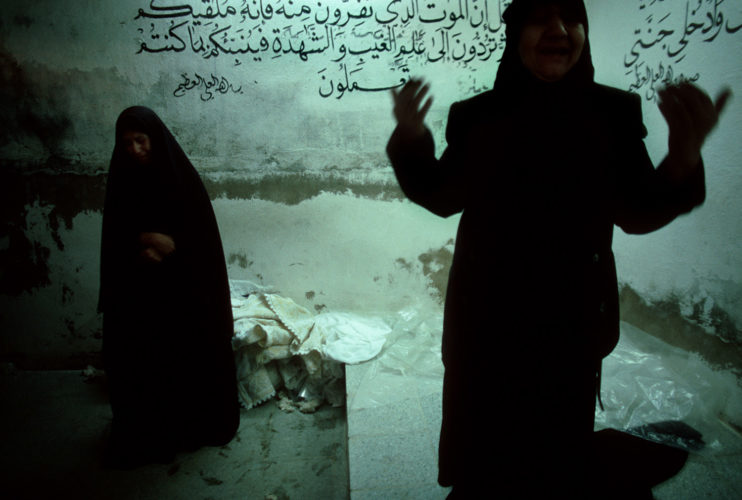
Baghdad under the bombs
-
March 29, 2003 - Two Iraqi women mourn in the wash room of the a Shi'ite mosque's funerarium the death of a young girl killed during coalition bombing over Baghdad. The Koranic verse written on the wall reads: "Tell them (God speaking to prophet Mohammad) that the death you are trying to escape will always catch up with you. You will then return to God -the one who knows about the unknown, about the past and about what is happening. He will ask you about your past life and all your acts." -
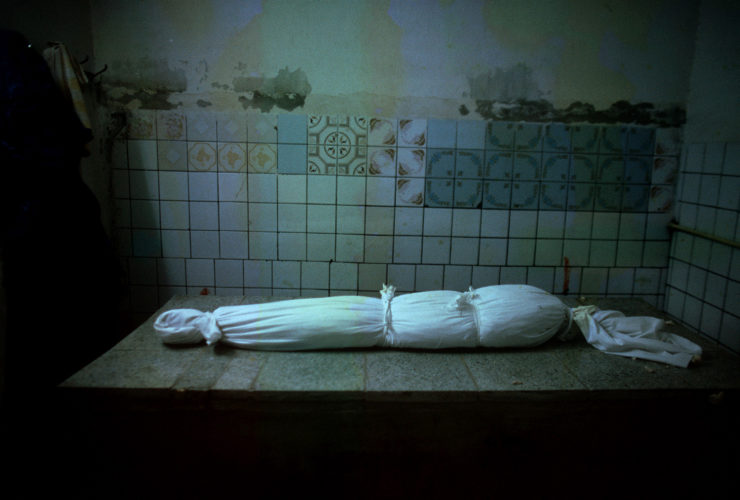
Baghdad under the bombs
-
March 29, 2003 - A young Iraqi girl lays, packed in a white sheet, on the marble table of the wash room in the a Shi'ite mosque's funerarium after she was killed by a bomb blast during coalition bombing of Baghdad -
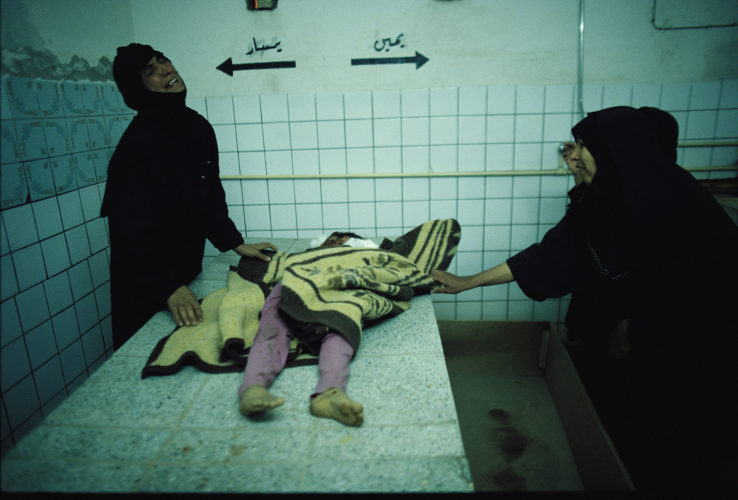
Baghdad under the bombs
-
March 29, 2003 - At nine tonight I got word that 50 people had been killed in an explosion in a shopping center outside Baghdad. Some of the victims had been taken to a nearby mosque. "Can I go in?" I asked when the door opened, though I didn't know what was inside. And maybe because I am a woman, I was ushered into a stark room with signs, where two women were bathing the body of a young relative in preparation for burial. It's unclear whether the explosion was caused by a U.S. bomb or an Iraqi missile, but in the end, it doesn't really matter for this 12-year-old girl. -
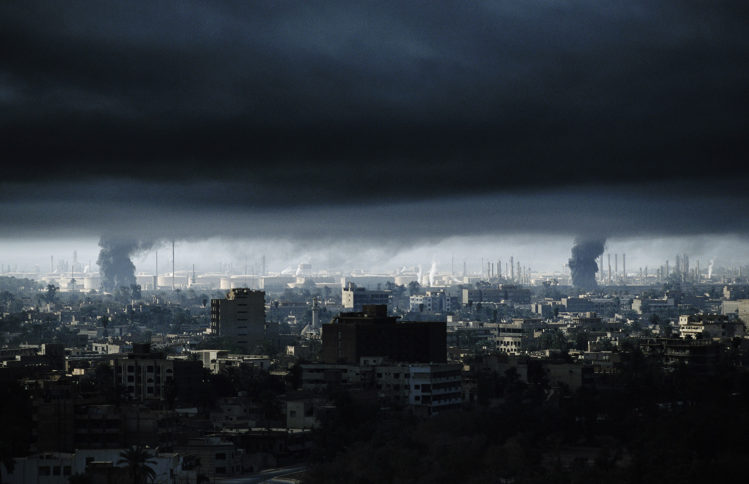
Baghdad under the bombs
-
March 29, 2003 - A black cloud above Baghdad. In an attempt to create a thick black cloud and blind the coalition planes and guidance system on cruise missiles, the Iraqi defense has set fire on trenches filled with oil. -
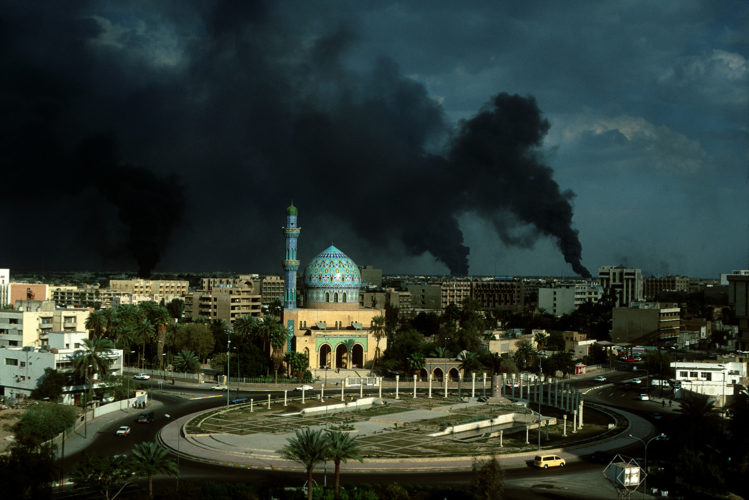
Baghdad under the bombs
-
April 2003 - Baghdad sky polluted by oil smoke. During the three-week coalition air raids over Baghdad, Iraqis burned oil fires in and around the city, in a desperate attempt to blind jet fighters and fool guided missiles. A medieval defense technique against 21st century high-tech weaponry. -
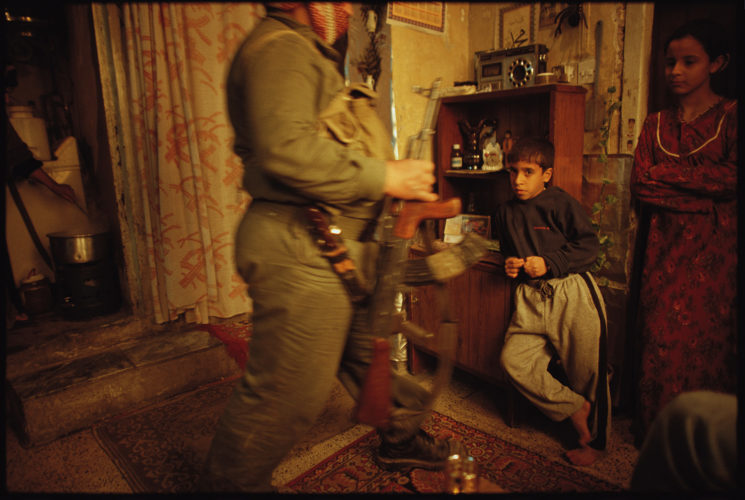
Baghdad under the bombs
-
March 26, 2003 - So far, the bombs have been amazingly accurate, but even so the safest strategy is to remain indoors. Today, I managed to have tea with the family of a low-level Baath party loyalist. Toting a Kalashnikov, he went in and out to meet friends while his son and teenage daughter were confined indoors, feeling trapped in their two-room apartment and listlessly watching television reruns of Saddam in action. -
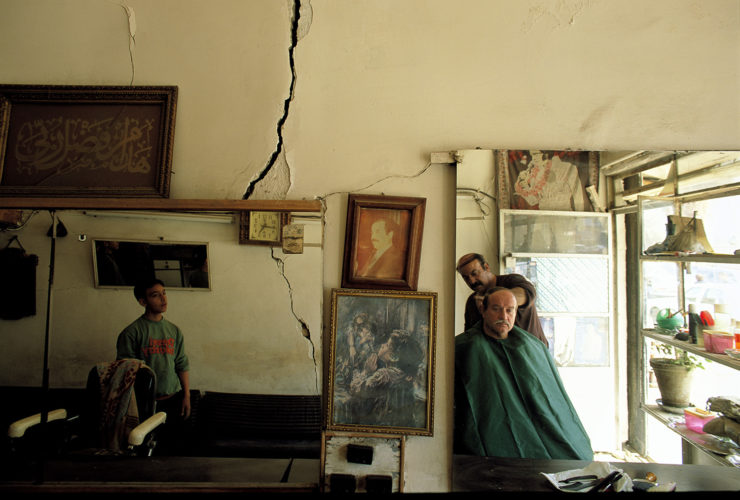
Baghdad under the bombs
-
March 28, 2003 - This morning I saw a man getting a haircut in a building next to a bombed-out communication center. In one sense that's crazy, risking your life to get a haircut. But these are crazy times. Last night I couldn't decide whether to take my first bath in weeks. What if a bomb dropped while I was in the tub? So I understood this man's desire for normalcy, his early morning trip to this barber shop, with its posters of Saddam and Elvis testifying to the mix of influences that have made up modern Iraq. An hour after I left, the building next door was bombed again. -
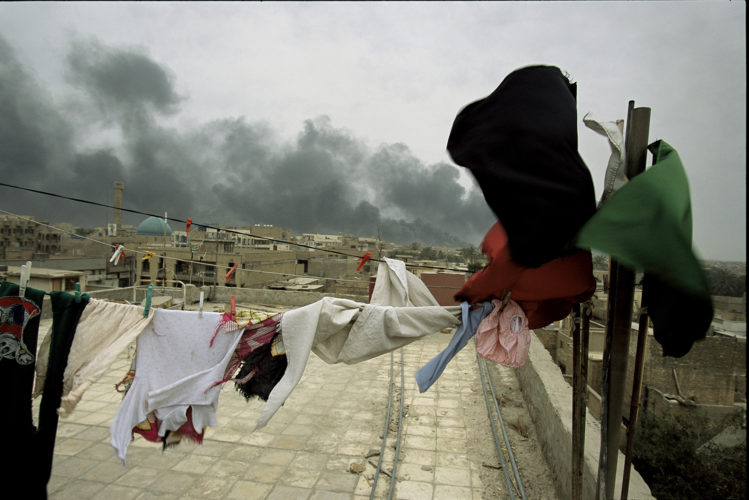
Baghdad under the bombs
-
March 27, 2003 - The bombing has been going on for a week now and everyone is so tired of it. Women are the most affected by war, I think, because even as the bombs are falling, they still have to cook the meals and wash the clothes, and they worry for their children. People are coughing from the oil fires, set by the Iraqis to create a wall of smoke to confuse the U.S. Air Force. Before the bombing started, when people were so nervous about what was to come, I'd say, "Don't worry. It will be short." But the truth is, war is never short when you're living it. -
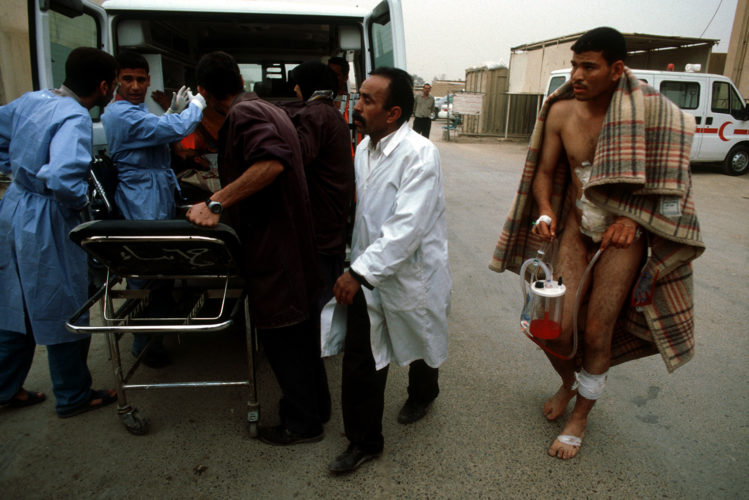
Baghdad under the bombs
-
April 2003 - Injured Iraqi soldier arrives naked at the emergency room of the Al Kindy hospital in Baghdad during the coalition air raids. Once injured, the soldiers were undressed before being sent to the hospital, therefor, no one could see they belong top the Iraqi Army, who claims no casualties. -
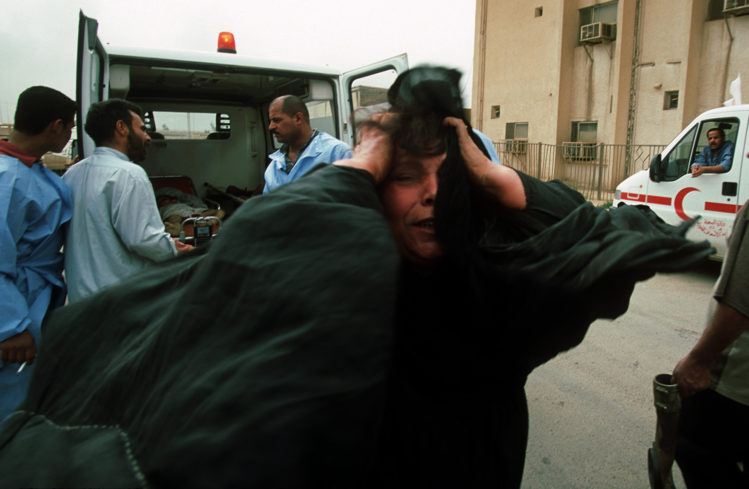
Baghdad under the bombs
-
April 2003 - A women in pain after she dropped her child to the emergency room at the Al Kindi Hospital in Baghdad. Her daughter was injured by a bomb during the coalition air raids over Baghdad. -
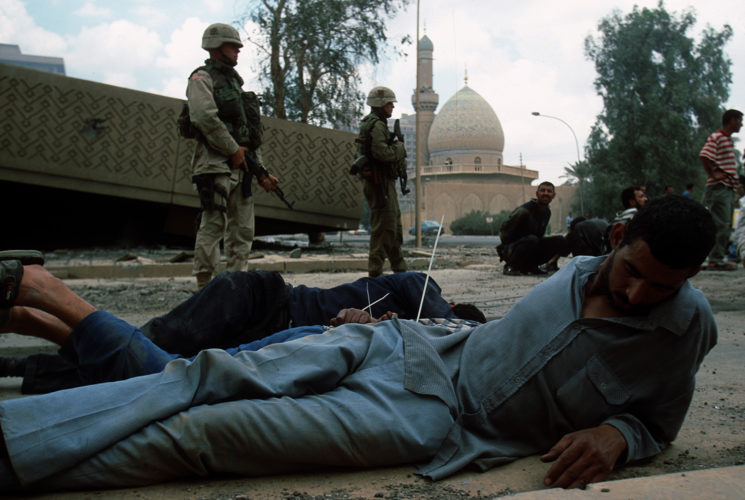
Baghdad after the bombs
-
April 2003 - Civilians caught by the US soldiers after they entered the city. -
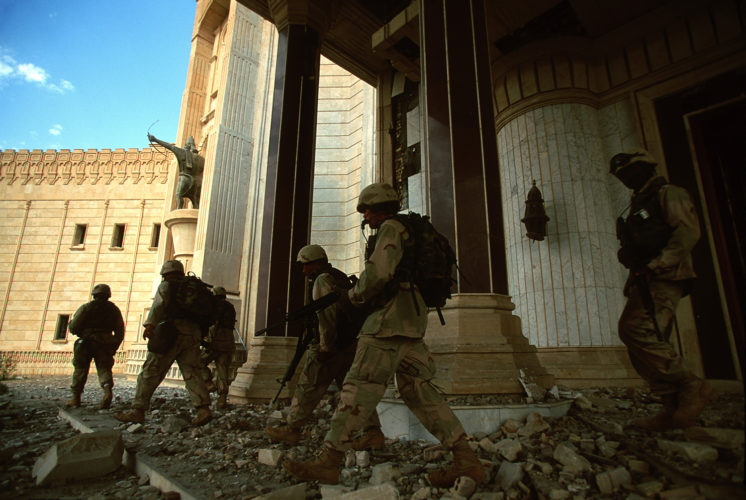
Baghdad after the bombs
-
April 2003 - US soldiers entering Baghdad they have just taken. -
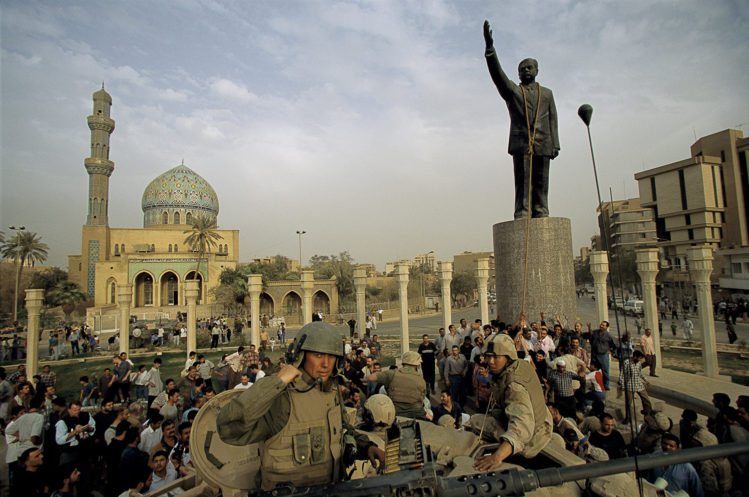
Baghdad after the bombs
-
April 9, 2003 - The U.S. soldiers were so tired from their weeks in the desert, but their first concern was to help the Iraqis pull down this statue. A marine covered Saddam's face with an American flag for a moment and then had second thoughts. Once the statue came down the Iraqis began jumping on it, pulling the head around the city in an exuberant display. For the first time in days, the smoke from the oil fires lifted and the sky looked blue again. There was an incredible sense of relief in the crowd. Not only because of rumors that Saddam had fled Baghdad, but because everyone knew that now the bombing would stop. -
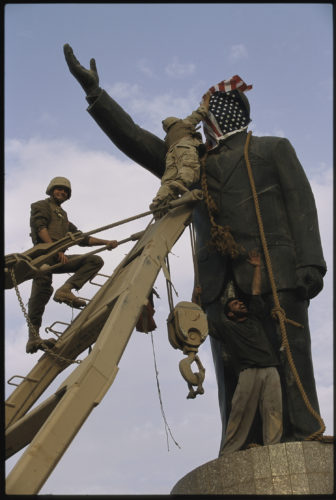
Baghdad after the bombs
-
April 9, 2003 - The U.S. soldiers were so tired from their weeks in the desert, but their first concern was to help the Iraqis pull down this statue. A marine covered Saddam's face with an American flag for a moment and then had second thoughts. Once the statue came down the Iraqis began jumping on it, pulling the head around the city in an exuberant display. For the first time in days, the smoke from the oil fires lifted and the sky looked blue again. There was an incredible sense of relief in the crowd. Not only because of rumors that Saddam had fled Baghdad, but because everyone knew that now the bombing would stop. -
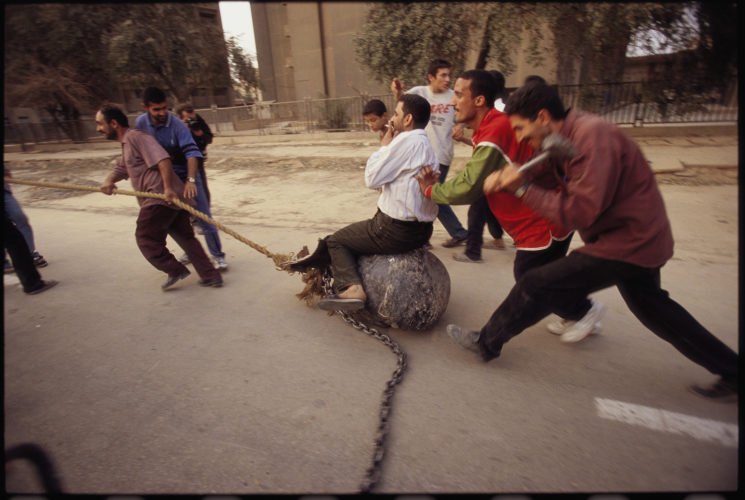
Baghdad after the bombs
-
April 9, 2003 - The U.S. soldiers were so tired from their weeks in the desert, but their first concern was to help the Iraqis pull down this statue. A marine covered Saddam's face with an American flag for a moment and then had second thoughts. Once the statue came down the Iraqis began jumping on it, pulling the head around the city in an exuberant display. For the first time in days, the smoke from the oil fires lifted and the sky looked blue again. There was an incredible sense of relief in the crowd. Not only because of rumors that Saddam had fled Baghdad, but because everyone knew that now the bombing would stop. -
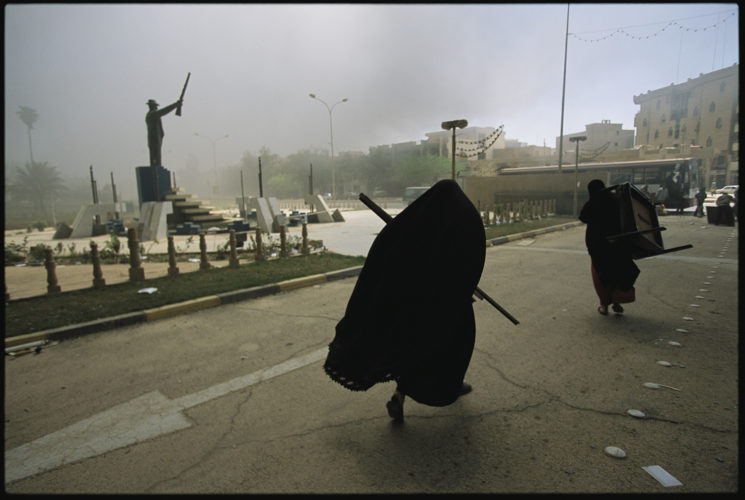
Baghdad after the bombs
-
April 10, 2003 - Already, yesterday's moment of peace is gone, replaced by a growing sense of anarchy and uncertainty. With no more dictatorship and no more rules, Baghdad is in the looters' hands. I followed gangs of men and entire families trashing and burning every ministry building, department store, museum,even hospitals and jails. Yes, they wanted the stuff, but also revenge for the years of oppression. -
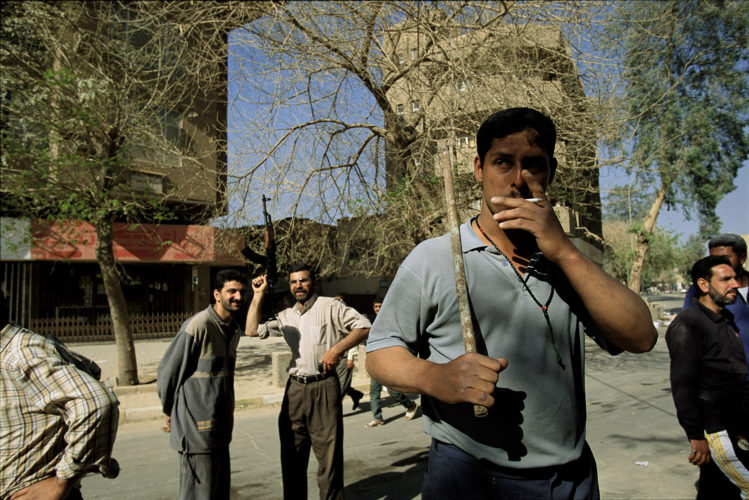
Baghdad after the bombs
-
April 11, 2003 - "What should I photograph now?" I asked my friend Rad yesterday. "The looting of the palaces?" And he got upset with me. "These looters are not true Iraqis," he said. So I went to a neighborhood that had organized to keep away the looters. Middle-class men had set up check points and barricades on the streets, stopping cars and threatening anyone who looked suspicious. Tonight, I heard gunfire around the city. Baghdad isn't safe any more, and no one knows who to blame. -
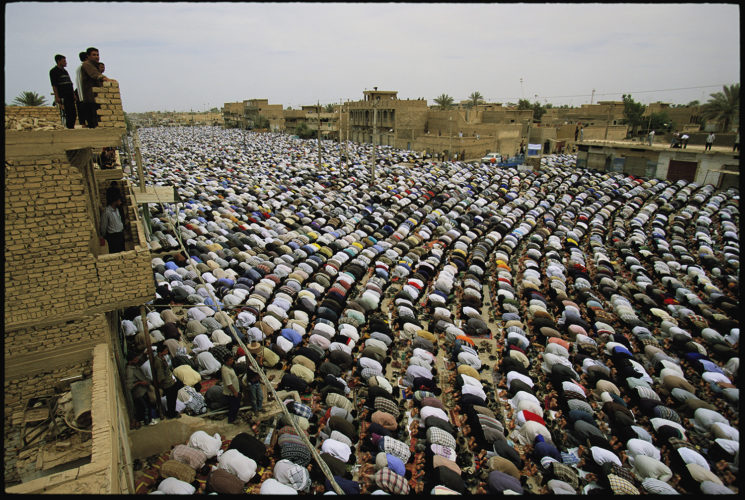
Baghdad after the bombs
-
April 18, 2003 - Before the war, Iraqis told me, "It doesn't matter if I'm Shiite or Sunni," referring to the two major sects of Islam. Today proved otherwise. At one o'clock on Friday, thousands of Shiites gathered outside a mosque in Saddam City (renamed Saher city, after the fall of Saddam) to pray openly after 30 years of dictatorship. Shiites make up 60 percent of Iraq's population, but under Saddam's secular yet Sunni-dominant regime, many practiced their religion only in secret. -
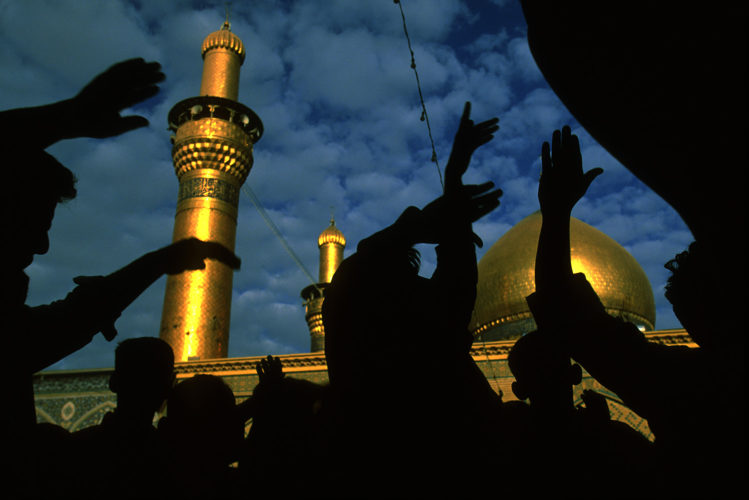
Baghdad after the bombs
-
April 2003 - Inside Kerbala shrine, Shiite Muslim pilgrims celebrate the 10th day of Muharram, the anniversary of the martyrdom of Imam Hussein. Under Saddam's regime, this ritual was discouraged as too extreme, so now it is seen as a true sign of liberation. -
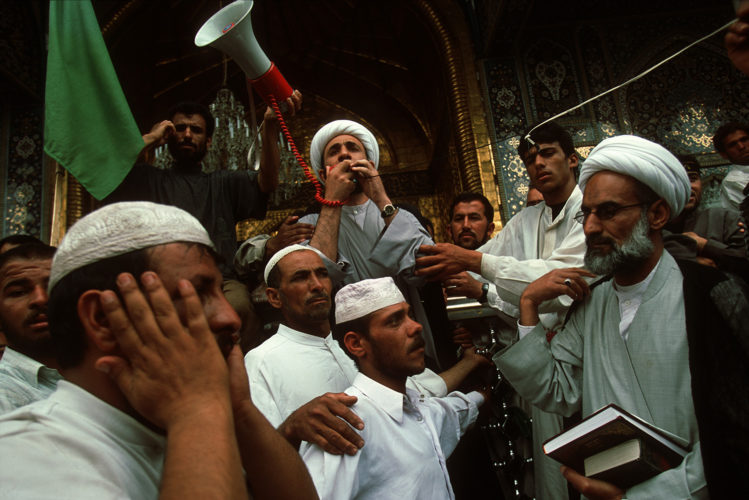
Baghdad after the bombs
-
April 25, 2003 - Inside Kerbala shrine, Shiite Muslim pilgrims celebrate the 10th day of Muharram, the anniversary of the martyrdom of Imam Hussein. Under Saddam's regime, this ritual was discouraged as too extreme, so now it is seen as a true sign of liberation. -
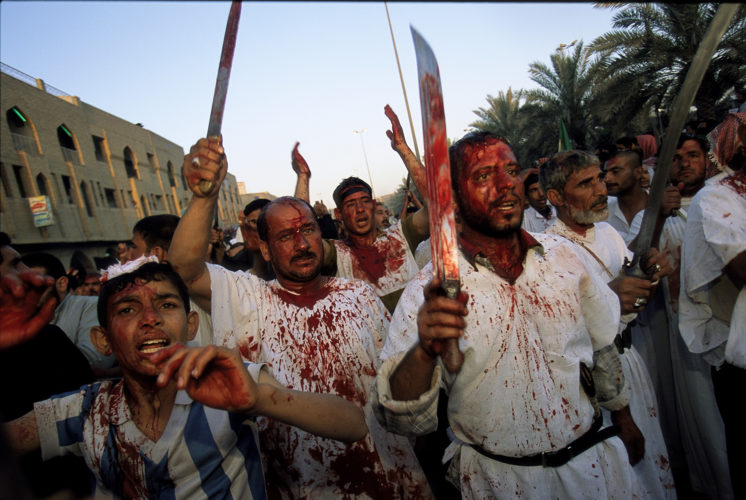
Baghdad after the bombs
-
April 23, 2003 - I kept wondering if there would be a moment when the Iraqis would celebrate the end of the war, and today I realized this was it: Since two days, crowds of Shiite pilgrims poured into the city of Kerbala, 80 miles from Baghdad, to celebrate the 10th day of Muharram, a festival commemorating the martyrdom of Imam Hussain, the grandson of Mohammad. The most fervent believers flagellated themselves and cut their heads with knives to show their grief and sorrow. Under Saddam's regime, this ritual was discouraged as too extreme, so now it is seen as a true sign of liberation. -
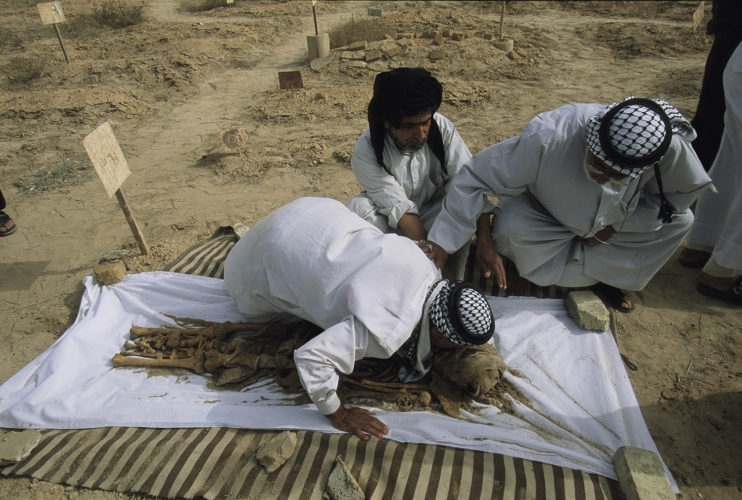
Baghdad after the bombs
-
April 28, 2003 - As President Bush declared the end of fighting, I watched Iraqis dig up Saddam's victims. In a cemetery near Baghdad's Abu Ghraib jail, where hundreds of opponents were executed, two thousand people were buried with only a number to mark the graves. When a list of names corresponding to the numbers was released, families came to identify loved ones and give them a proper burial. The war is over, but the discovery of those who disappeared long ago is only beginning. -
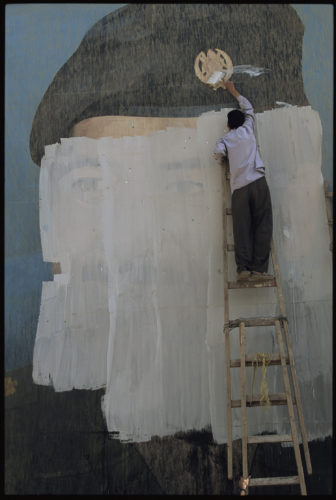
Baghdad after the bombs
-
April 2003 - Iraqi show their resentments in defacing Saddam Hussein's portraits. -
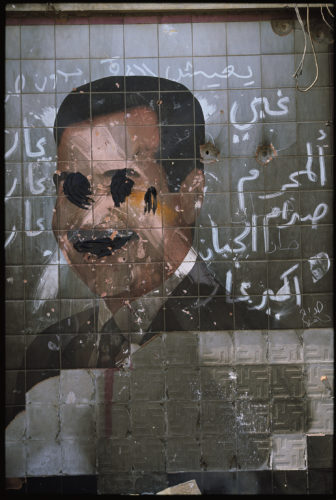
Baghdad after the bombs
-
April 2003 - Iraqi show their resentments in defacing Saddam Hussein's portraits.
War in Iraq
-
Alexandra documented the life inside the capital – and around – during the final countdown to war. She was there for the first coalition bombings and stayed until the arrival of the US Marines in town. She also witnessed the chaos that followwed the fall of the city and the reaction of the Iraqis once freed from the diactorship of Saddam Hussein.


